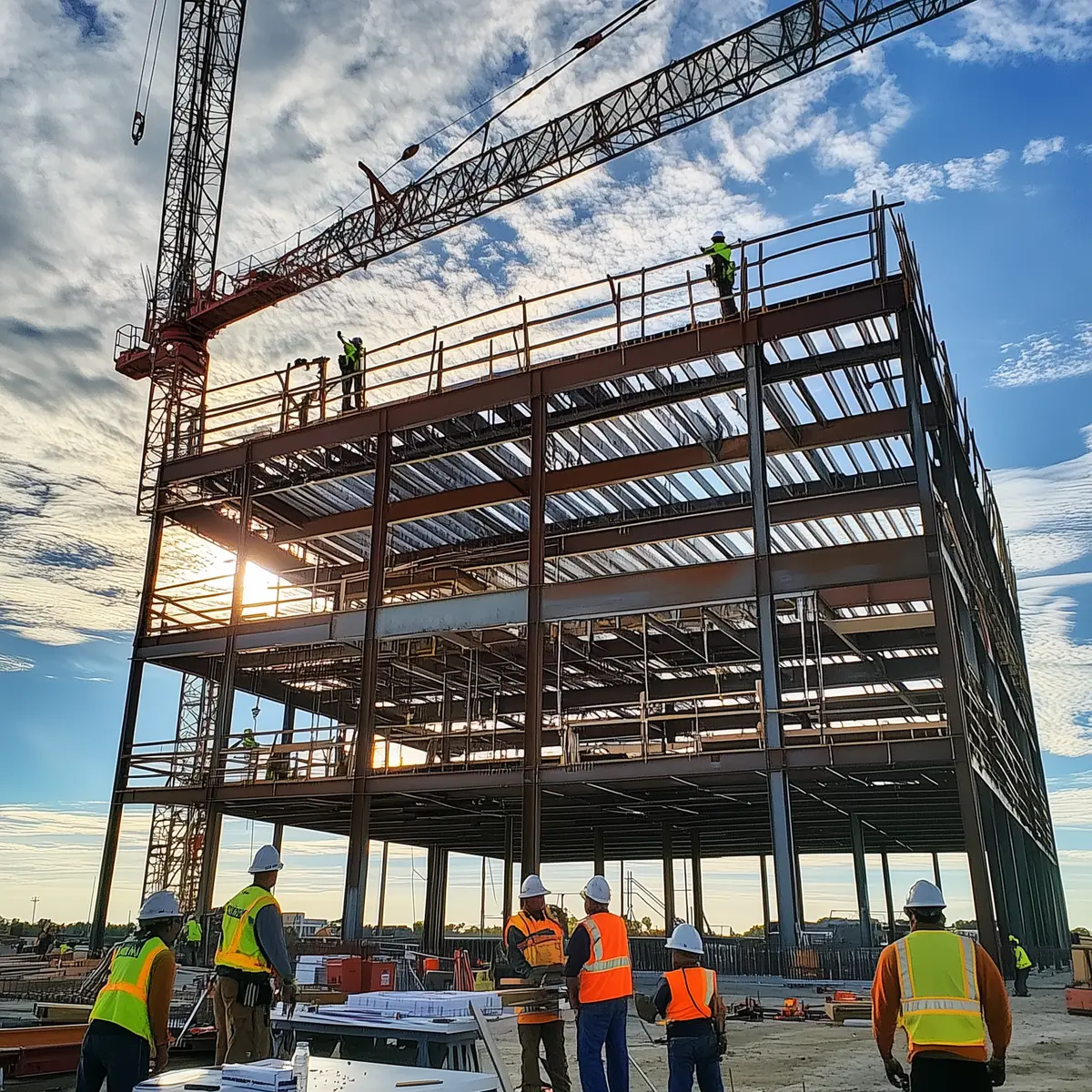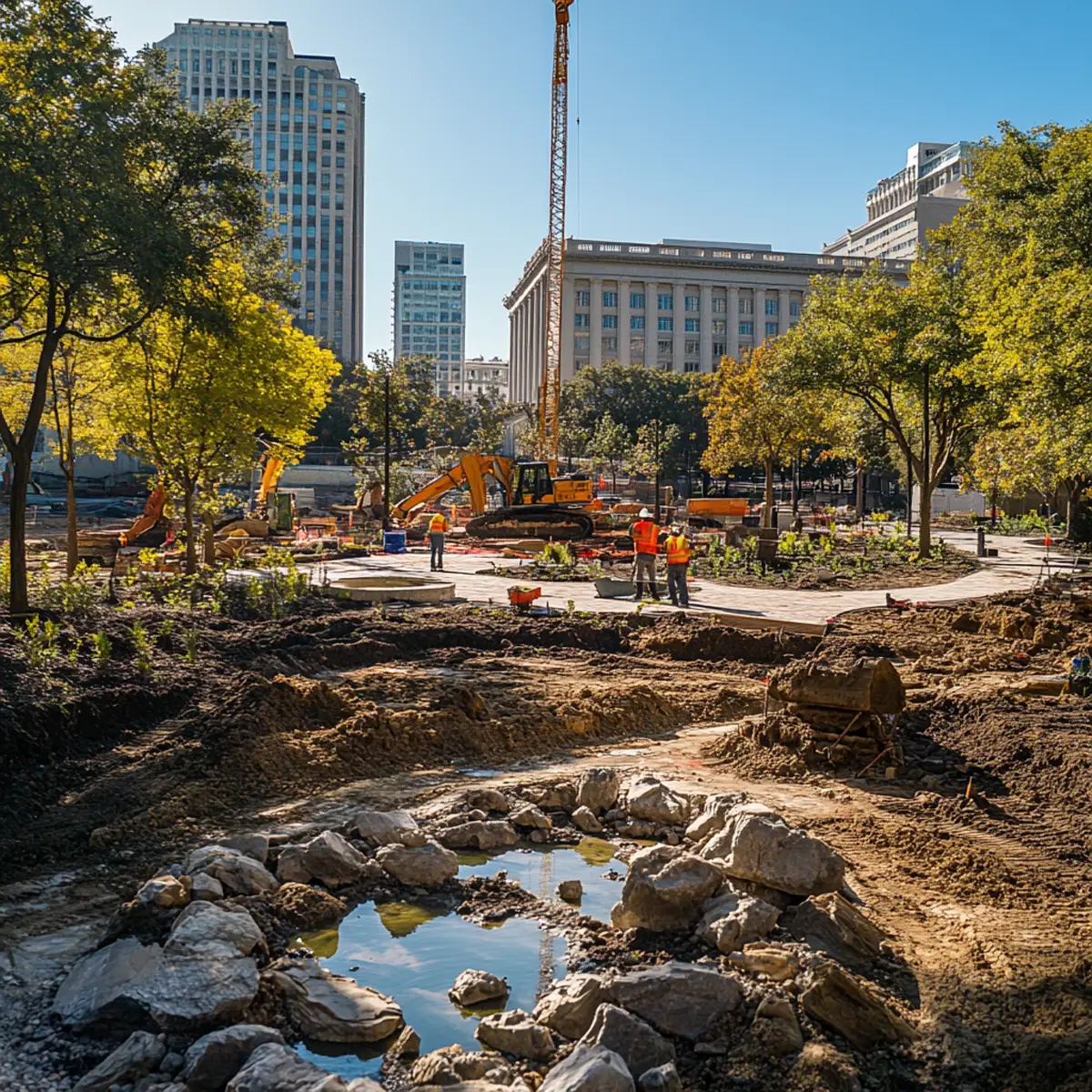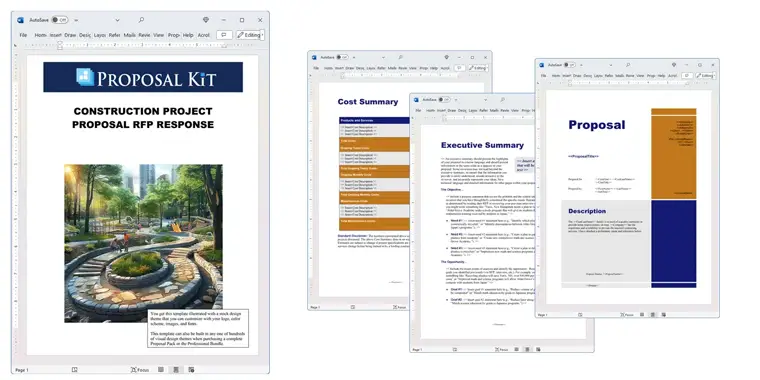How to write your Construction Project Proposal RFP Response
We include this 17 page layout with every Proposal Pack. If you want this template to have a different visual design theme than the one illustrated here, purchase any Proposal Pack design and create this template using the purchased design theme. This template is included in every Proposal Pack. If you get a Proposal Pack or the Professional Bundle, you can also make any variation of this template with different chapters to suit your needs.
We typically include more chapters in the templates than most people will need to give everyone more variety in the chapters they may need. You can trim down a long template by removing pages you do not need or combining multiple chapter topics into one page.
 DOWNLOADABLE, ONE-TIME COST, NO SUBSCRIPTION FEES
DOWNLOADABLE, ONE-TIME COST, NO SUBSCRIPTION FEES If you need this template on DVD media order from our Amazon shop.
If you need this template on DVD media order from our Amazon shop.
You can also create countless variations of this document to suit your needs using the included library of 2200+ chapters if ordering a Proposal Pack or Pro Bundle.
 What Our Clients Say
What Our Clients SayAfter purchasing the Proposal Kit Professional, buying the proposal pack was a no brainer. It makes putting your proposal together simple with its great automation capability. It definitely save time on putting together great proposals and you should definitely get it."
Co-Principal at A&A Property Solutions, Inc.
Related Article
Related Video
Related Templates
- Civil Engineering Construction Project Proposal
- Steel Erection Project Proposal
- Post-Construction Cleaning Services Proposal
- Reuse of Government Land Development Proposal
- Construction Project Proposal (Short)
- Construction Job Proposal Template
- Construction Work Proposal Template
- Woodworking Contractor Services Proposal
- Roofing Contractor Proposal
- Civil Engineering Project Proposal
- Masonry Contractor Proposal
- Parking Lot Expansion Proposal
- Elevator and Escalator Sales and Service Proposal
- Custom Home Building Proposal
- Siding Contractor Proposal
- Glass and Glazing Contractor Proposal
- Office Renovation Proposal
- Office Bathroom Renovation Project Proposal
- Drilling Project Proposal
- Demolitions Construction Project Proposal
Writing Your Construction Project Proposal RFP Response with Proposal Kit
Writing a construction project proposal RFP response can seem overwhelming, especially if you're new to the process. What is the best way to tackle this challenge? Utilize the Proposal Kit. This comprehensive toolkit simplifies the proposal-writing process, transforming what could be a complex task into a manageable one. With an extensive template library and Wizard software program, Proposal Kit provides everything you need to write a compelling proposal.
If you find yourself needing to draft a construction proposal in response to an RFP, you're not alone. Many businesses need a clear path forward to overcome this challenge.
What Types of Projects Are Construction Project Proposal RFP Responses Written For?
When responding to a Request for Proposal (RFP) in construction, it's crucial to understand the types of projects you might be dealing with. There are many complexities to managing a construction project beyond just writing a proposal, and you will need to have these systems squared away before you are ready to respond to complex construction RFPs. Here are ten examples of typical construction project proposal RFP responses:
- Asphalt paving for new or existing roads
- Bridge construction and repair
- Public park development and landscaping
- Water and sewage system upgrades
- School building and campus improvements
- Hospital expansions and renovations
- Government building security upgrades
- Commercial real estate development
- Residential housing developments
- Electrical grid modernization projects
Chapters this template is built with
Proposal Kit is more than just a collection of templates; it's a comprehensive system designed to make proposal writing as straightforward as possible. Here's how a selection of Proposal Kit's templates can be utilized for your construction proposal.
Expanding on these topics within your construction project proposal RFP response will showcase your company's thorough preparation and professionalism and significantly increase your chances of winning the bid.
Each chapter comes in a Word document template, which you can customize and then save as a PDF for delivery. This selection is just a glimpse into the thousands of templates available, allowing for a fully customized proposal.
Cover Letter
Your cover letter is the first impression you make on the potential client. It should introduce your company succinctly, showcasing your understanding of the project's goals and how your expertise aligns with these needs. Highlight your enthusiasm for the project and briefly mention how your team's unique capabilities make you the best choice for the job. This letter sets the tone for the rest of the proposal, aiming to create a connection with the reader and encourage them to consider your proposal seriously.
Estimate
The estimate section is where you provide a detailed cost breakdown for the project. Use Proposal Kit's line-item quoting database system to itemize every aspect of your budget, from labor to materials. This transparency helps build trust with your clients by showing them exactly what they're paying for. It also demonstrates your thorough planning and ability to manage project finances effectively.
Statement of Work
The Statement of Work (SoW) section is the heart of your proposal. You will clearly define the project's objectives, scope, and deliverables here. Outline what your project will accomplish and the benefits it will bring to the client. Be specific about the services you will provide, including any methodologies or technologies you will use, to give the client a clear understanding of what to expect upon project completion.
Project Plan
In the project plan section, lay out your project's proposed timeline and phases. This includes the start and end dates, key milestones, and any dependencies that might affect the timeline. A well-structured project plan demonstrates your project management skills. It provides a roadmap for how the project will proceed, reassuring that it will be completed on time and within budget.
Site Preparation
Discuss the initial steps and preparations required at the project site before the main work begins. This might include clearing the site, setting up temporary structures, or conducting initial surveys. Detailing this process shows your commitment to a smooth project startup and consideration for minimizing disruptions.
Scheduling
Provide a detailed schedule that includes the project timeline and significant milestones. This section should align with the project plan but focus on each phase's timing and critical deliverables. A clear schedule sets realistic expectations and ensures all parties are aligned on the project's progress.
Cleanup
Your approach to maintaining a clean and safe worksite is crucial, especially in construction projects. Explain your strategies for waste disposal, recycling, and site cleanup during and after the project. This demonstrates your commitment to safety and environmental responsibility.
Materials
List and describe all materials required for the project, including specifications and quantities. Providing details on the quality and source of the materials reinforces the reliability of your project and ensures that the client understands the standards you adhere to.
Permits and Licenses
Identify all necessary permits and licenses for the project and describe how you will obtain them. This section reassures the client that your project will comply with all local laws and regulations, avoiding potential legal issues.
Inspection
Outline your plan for internal and external inspections throughout the project to ensure quality control. This should include the types of inspections, who will carry them out, and at what stages. A robust inspection plan is critical to delivering a high-quality project.
Qualifications
Highlight your team's expertise and experience, focusing on how their skills and past projects make them ideal for the current project. Include certifications, special training, or awards demonstrating your team's capability.
Company History
Share your company's background, emphasizing your track record of success in similar projects. This section builds credibility and trust, showing the client your solid foundation and history of delivering on promises.
Insurance and Bonding Documents
Provide proof of insurance and bonding as required for the project. This meets a typical requirement for construction projects and assures the client that your company is prepared to mitigate risks and handle any unforeseen issues professionally.
Use cases for this template
Alex's Winning Proposal
Alex, behind ConstructRight Innovations, faced a formidable challenge: writing a proposal to outshine the competition for a city project involving the renovation of a historic city park. The project required a delicate balance of modern construction techniques and preservation practices. Alex turned to Proposal Kit, a decision that proved pivotal. The comprehensive templates guided him through structuring his proposal, ensuring every critical element from the RFP was addressed thoroughly.
He detailed his innovative approach to preserving the park's historic elements while incorporating sustainable, modern infrastructure. The clarity and professionalism of Alex's proposal, enhanced by Proposal Kit's organized layout and design, resonated with the city officials. When the announcement came, Alex's proposal was the clear winner, a testament to the power of a well-prepared proposal and the precision that Proposal Kit brought to his work.
Jordan Beats the Clock
Jordan, an employee at BuildTech Solutions, was in a race against time. The company had been allowed to bid on a significant construction project, but the catch was the tight submission deadline. Jordan leveraged the Proposal Kit and AI assistance to compile a comprehensive proposal quickly. She used AI to generate specific content sections, such as the company's approach to environmental sustainability and innovative construction methodologies, based on prompts she designed. This synergy of AI and Proposal Kit allowed Jordan to draft a proposal that was complete and compliant with the RFP's requirements and rich in detail and innovation.
Her ability to deliver under pressure exceeded her boss's expectations-it set a new standard for efficiency and quality in the company's proposal development process. Jordan's story became an inspiring example of how embracing technology, like Proposal Kit and AI tools, can turn a pressing deadline into an opportunity for excellence.
Casey's Competitive Edge
Casey, the leader of a medium-sized construction firm, understood that responding to a high-stakes construction project RFP required more than just industry expertise; it demanded a presentation that could communicate the company's unique value proposition. The project in question involved:
- Developing a new community center as a hub for local activities and events.
- Requires a thoughtful approach to design.
- Sustainability.
- Community integration.
With the Proposal Kit, Casey found the perfect tool. The software's intuitive templates allowed him to write a proposal highlighting his team's strengths in innovative design and community-focused planning. Casey was particularly impressed by the ease with which he could customize the proposal, tailoring each section to echo the project's specific demands and the company's commitment to delivering value beyond construction. The result was a proposal showcasing Casey's company as the best fit for the project and underscoring the firm's dedication to enriching the community. Casey's strategic use of Proposal Kit played a crucial role in securing the project, providing a competitive edge that was impossible to overlook.
Conclusions and Recommendations
These situations underscore the impact Proposal Kit can have on the proposal writing process, from navigating tight deadlines to enhancing competitive positioning. The Proposal Kit is essential for anyone looking to write winning proposals in the construction industry.
Proposal Kit has proven invaluable for businesses navigating the construction RFP landscape. By providing a structured approach to proposal writing, complete with customizable templates and a sophisticated quoting system, Proposal Kit not only simplifies the task but also enhances the quality of your proposals. Proposal Kit is your solution to writing an effective construction project proposal RFP response.
Also Known As
This template may also be referred to in different ways or be used in more specialized situations, such as:
- Construction Project Bid Submission
- Building Project Proposal Response
- Infrastructure Project Tender Reply
- Construction Initiative Quotation Response
- Property Development Response Proposal
- Construction Proposal Offer Document
- Project Construction Submission Proposal
- Construction Scheme Response Form
- Construction Project Response to Request for Proposal
- Building Development Project Proposal Rejoinder
Abstract
 Developing a construction project proposal RFP response can be a challenging task for many construction firms. Using the Proposal Kit streamlines the entire process, making it less cumbersome for construction companies to respond to construction RFPs efficiently. This toolkit provides an expansive library of templates and a unique Wizard software program that guides potential contractors through creating an effective RFP response. By clearly outlining project requirements and using past work, the Proposal Kit assists in creating a construction proposal that stands out during the evaluation process.
Developing a construction project proposal RFP response can be a challenging task for many construction firms. Using the Proposal Kit streamlines the entire process, making it less cumbersome for construction companies to respond to construction RFPs efficiently. This toolkit provides an expansive library of templates and a unique Wizard software program that guides potential contractors through creating an effective RFP response. By clearly outlining project requirements and using past work, the Proposal Kit assists in creating a construction proposal that stands out during the evaluation process.
In the competitive field of construction, where government agencies and private project owners often issue construction requests, understanding the RFP process is crucial. Construction RFPs typically require contractors to detail the scope of work, project schedule, and specific project approaches, ensuring submissions align with the outlined criteria. The Proposal Kit aids contractors in formalizing proposal content, including vital components such as a cover letter, statement of work, project plan, and cost estimations. This structured approach not only saves time but also enhances the proposal's quality, giving bidders an edge in the selection process.
Construction companies have increasingly relied on software tools like the Proposal Kit to manage the complexities of the bidding process. As contractors prepare their construction RFP responses, they must account for submission requirements, insurance requirements, and the contractor's qualifications statement. By integrating detailed descriptions and project background information alongside innovative construction methods and design plans developed by architects, firms can ensure their proposals are tailored to meet the specific needs of government construction projects and other entities.
 Ultimately, the Proposal Kit serves as an invaluable resource, enabling construction companies to produce winning construction proposals that resonate with decision-makers and secure awarded contracts. The toolkit's comprehensive templates and clear expectations help construction firms maintain transparency and communicate with stakeholders, strengthening relationships and fostering successful partnerships.
Ultimately, the Proposal Kit serves as an invaluable resource, enabling construction companies to produce winning construction proposals that resonate with decision-makers and secure awarded contracts. The toolkit's comprehensive templates and clear expectations help construction firms maintain transparency and communicate with stakeholders, strengthening relationships and fostering successful partnerships.
The construction RFP process is an intricate process that begins with understanding the project requirements laid out by the RFP issuer, often a government agency or a private sector project owner. The Proposal Kit is a powerful tool for construction companies, offering an advantage in navigating this process. This toolkit facilitates the creation of a winning construction proposal by providing a structured framework that includes a comprehensive selection of templates. These templates guide the construction firm in assembling a cohesive proposal that addresses every topic of the RFP document, from project scope to cost estimations.
Construction firms leverage the Proposal Kit to engage more in the bidding process. By using its resources, they can better articulate their project approach, outline the project schedule, and ensure compliance with technical requirements. The toolkit's intuitive design allows for the incorporation of detailed case studies and past work examples, which highlight the firm's relevant experience and reinforce its capability as a qualified contractor. Additionally, it aids in creating an executive summary that captures the essence of the proposal, serving as a persuasive overview for the evaluation process.
 A key part of responding to construction RFPs is setting clear expectations regarding contract terms and the procurement process. The Proposal Kit assists in formalizing proposal content, ensuring that submission requirements are met with precision. It encourages the inclusion of a contractor's qualifications statement and an organizational chart to provide a clear view of the project team and their responsibilities. Furthermore, it emphasizes the importance of addressing technical and insurance requirements, factors that are often in the decision-making process for awarded contracts.
A key part of responding to construction RFPs is setting clear expectations regarding contract terms and the procurement process. The Proposal Kit assists in formalizing proposal content, ensuring that submission requirements are met with precision. It encourages the inclusion of a contractor's qualifications statement and an organizational chart to provide a clear view of the project team and their responsibilities. Furthermore, it emphasizes the importance of addressing technical and insurance requirements, factors that are often in the decision-making process for awarded contracts.
In preparing for new projects, construction companies must present a detailed description of their approach to tackling potential challenges, such as cost overruns and project delays. The Proposal Kit enables firms to outline effective risk management strategies and demonstrate their commitment to quality standards and social responsibility. By showcasing innovative construction methods and a strong track record of success through word-of-mouth referrals and past work, firms can strengthen their case as the best option for the particular project at hand.
Moreover, the Proposal Kit encourages construction companies to explore general sourcing and to engage with suitable vendors and subcontractors. This engagement is vital for optimizing resources and ensuring the delivery of high-quality construction services. By maintaining clear communication and prioritizing partnerships that hold similar values, construction firms can assure the project owner of their dedication to achieving the project's objectives efficiently.
 In summary, the Proposal Kit equips construction companies with the tools necessary to produce an RFP response. Focusing on topics such as bid sheets, cost estimations, and project timelines aids in creating a proposal that resonates with decision-makers and stands out in the competitive landscape of construction projects. This comprehensive approach not only enhances the firm's chances of securing contracts but also establishes a foundation for successful project execution and long-term client relationships.
In summary, the Proposal Kit equips construction companies with the tools necessary to produce an RFP response. Focusing on topics such as bid sheets, cost estimations, and project timelines aids in creating a proposal that resonates with decision-makers and stands out in the competitive landscape of construction projects. This comprehensive approach not only enhances the firm's chances of securing contracts but also establishes a foundation for successful project execution and long-term client relationships.
Frequently Asked Questions
What should a construction project proposal RFP response include?
When drafting an RFP response to a construction project proposal, you should include a detailed project overview, your qualifications and experience, a comprehensive project plan with timelines, a precise cost estimate, and a risk management plan. Additionally, highlight any unique capabilities or innovations your firm can bring to the project. Ensure that you address all requirements and questions in the RFP to demonstrate your attention to detail and understanding of the client's needs.
How do I make my proposal stand out from the competition?
To make your proposal stand out, focus on clarity, professionalism, and thoroughness. Use a clean, well-organized layout with headings and subheadings for easy navigation. Emphasize your unique selling points, such as specialized skills, past successful projects, or innovative approaches. Incorporate visuals like charts, diagrams, and photos of past projects to enhance readability. Personalize your response by understanding the client's objectives and showing how your firm can meet or exceed those needs.
What is the best way to present my proposal's budget and cost estimates?
Present your budget and cost estimates transparently and in detail. Break down the costs into labor, materials, equipment, subcontractors, and contingencies. Use tables or spreadsheets for clarity and include explanations for each cost component. Clearly state any assumptions or exclusions and outline potential cost-saving measures. Providing a narrative that explains the rationale behind your cost estimates can also help build trust with the client.
How do I address potential risks and challenges in my proposal?
Identifying and addressing potential risks and challenges in your proposal demonstrates foresight and preparedness. Include a dedicated section that outlines the key risks associated with the project, such as delays, budget overruns, or site-specific issues. For each risk, describe your mitigation strategies and contingency plans. Highlight your team's experience managing similar risks in past projects to reassure the client of your ability to handle unforeseen challenges effectively.
What is the importance of including past project examples and references in my proposal?
Including past project examples and references is crucial for building credibility and trust. Showcase relevant projects highlighting your firm's experience and success in similar undertakings. Provide details on the project scope, budget, timeline, and outcomes. Whenever possible, include testimonials or reference letters from previous clients. This evidence of past performance gives the client confidence in your ability to deliver on their project and can significantly enhance the persuasiveness of your proposal.
15% Off Discount
![]() Add To Cart This Word Template Only
Add To Cart This Word Template Only
 Add To Cart Proposal Pack for Any Business
Add To Cart Proposal Pack for Any Business
 Add To Cart Proposal Kit Professional Bundle
Add To Cart Proposal Kit Professional Bundle
 4.7 stars, based on 846 reviews
4.7 stars, based on 846 reviewsProposal Kit chapters used in this template
Cover Letter, Title Page, Table of Contents, Statement of Work, Estimate, Project Plan, Materials, Scheduling, Site Preparation, Cleanup, Inspection, Permits and Licenses, Insurance, Bonding Documents, Company History, Qualifications, Back Page
Included Calculator Spreadheets
These Excel calculator spreadsheets are included with this template. If you purchase a Proposal Pack or the Professional Bundle, these proposal pages are generated using an automated line-item database in the included Wizard software. The calculator spreadsheets are intended for use when purchasing only the static Word template.
You use this proposal for
- General business proposal
- Non-technical proposal
- RFP response
- Construction, contracting, building proposal
How to create this template with Proposal Pack Wizard
You can create this document using any of the logo-designed Proposal Packs. Pick any Proposal Pack with a logo design theme you like best; they will all work equally well. The Proposal Pack for Any Business is the pack with no extra added logos or colors - designed to be used plain or for you to customize with your logos and graphics.
The Proposal Pack design theme you purchase will determine the visual look of this template. The screenshot above only shows the plain generic design theme. Names and stories in examples are fictional; however, the templates are from real client use cases.
We include a library of chapters to be assembled based on your needs. All proposals are different and have different needs and goals. We designed Proposal Pack so you can customize the documents to suit your needs.
You will best create this document using the Proposal Pack Wizard - Expert Edition software to select this template and build it in the Proposal Pack logo design theme of your choice along with any desired customizations (such as adding additional chapters, removing unneeded chapters, changing the order of chapters, and importing your company logo). This template outlines a proposal for the described situation. Each user is responsible for typing in the actual content of the provided pages with their information to complete the proposal. Suggestions in the abstract may include features in higher-end packages and are facilitated by the selection of chapter templates to support the narrative of each proposal, which help guide the user in filling in the details.
You create this template using the Wizard software with an entire Proposal Pack library and software. We include the Expert Edition of the software in the Proposal Kit Professional bundle. Microsoft Word for Windows is required to use the customizing software. You can also edit Word document templates in other office software such as Word for Mac. We will assist Mac users in assembling complex templates for their first project if they do not have the required platform to run the Wizard software.
You only get the single assembled Word document if purchased as a stand-alone template. The individual template products include no other templates, samples, or software.
How to Build Templates Featured on Proposal Kit Website
Many people find the Proposal Kit website after searching for a specific proposal. Once you've purchased and installed the software, how do you build that template you found in the first place? This video shows you how to build any proposal you see on the Proposal Kit website.
Key Takeaways
- The Construction Project Proposal RFP Response is available as a ready-to-edit template.
- You can create unlimited custom variations of this template using a Proposal Pack or the Professional Bundle.
- Using a Proposal Pack or Professional Bundle, you can automate quotes and other financial pages with a line-item database.
- There are no ongoing subscription fees. You get lifetime unlimited use.
- We made Proposal Kit for freelancers, small businesses, and non-profits.
- Proposal Kit product content (templates, samples, software) is 100% written by humans.
 Ian Lauder has been helping businesses write their proposals and contracts for two decades. Ian is the owner and founder of Proposal Kit, one of the original sources of business proposal and contract software products started in 1997.
Ian Lauder has been helping businesses write their proposals and contracts for two decades. Ian is the owner and founder of Proposal Kit, one of the original sources of business proposal and contract software products started in 1997.By Ian Lauder
 Published by Proposal Kit, Inc.
Published by Proposal Kit, Inc.


 Cart
Cart


 Get 15% off ordering today:
Get 15% off ordering today: 

 Facebook
Facebook YouTube
YouTube X
X Search Site
Search Site